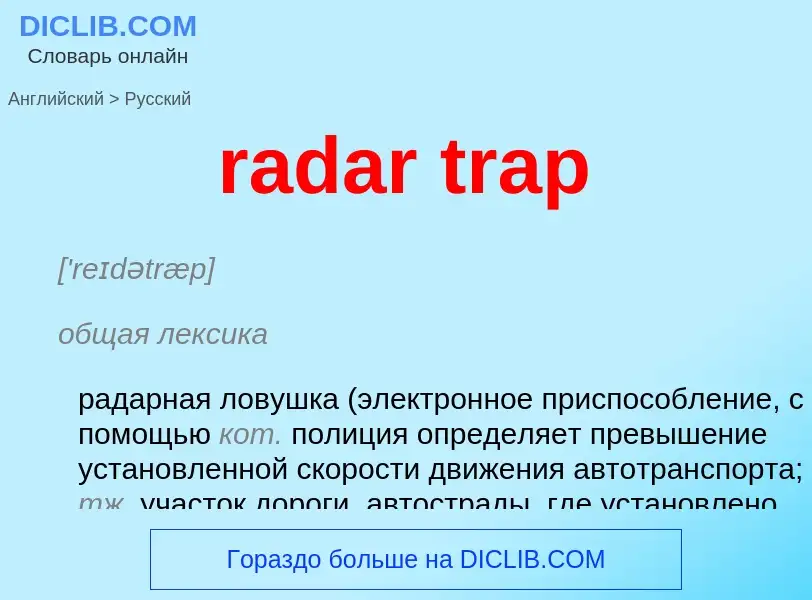Traducción y análisis de palabras por inteligencia artificial ChatGPT
En esta página puede obtener un análisis detallado de una palabra o frase, producido utilizando la mejor tecnología de inteligencia artificial hasta la fecha:
- cómo se usa la palabra
- frecuencia de uso
- se utiliza con más frecuencia en el habla oral o escrita
- opciones de traducción
- ejemplos de uso (varias frases con traducción)
- etimología
radar trap - traducción al ruso
['reɪdətræp]
общая лексика
радарная ловушка (электронное приспособление, с помощью кот. полиция определяет превышение установленной скорости движения автотранспорта; тж. участок дороги, автострады, где установлено такое приспособление)
радарная ловушка (для определения скорости автотранспорта)
нефтегазовая промышленность
ловушка для углеводородов
общая лексика
залежь тектонически экранированая
нефтегазовая промышленность
структурная ловушка (залежь нефти, приуроченная к тектоническим структурам)
Definición
Wikipedia

Insect traps are used to monitor or directly reduce populations of insects or other arthropods, by trapping individuals and killing them. They typically use food, visual lures, chemical attractants and pheromones as bait and are installed so that they do not injure other animals or humans or result in residues in foods or feeds. Visual lures use light, bright colors and shapes to attract pests. Chemical attractants or pheromones may attract only a specific sex. Insect traps are sometimes used in pest management programs instead of pesticides but are more often used to look at seasonal and distributional patterns of pest occurrence. This information may then be used in other pest management approaches.
The trap mechanism or bait can vary widely. Flies and wasps are attracted by proteins. Mosquitoes and many other insects are attracted by bright colors, carbon dioxide, lactic acid, floral or fruity fragrances, warmth, moisture and pheromones. Synthetic attractants like methyl eugenol are very effective with tephritid flies.


![nocturnal]] species. nocturnal]] species.](https://commons.wikimedia.org/wiki/Special:FilePath/An insect trap mounted onto a pick-up truck - ZooKeys-235-041-g003.jpeg?width=200)


![tilted blocks]] tilted blocks]]](https://commons.wikimedia.org/wiki/Special:FilePath/StratigraphicTrap5.png?width=200)
